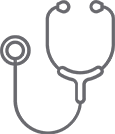
How Are Books Related to Better Health? Ross Sheline, MD Has the Story
Get his take on the link between reading and family medicine
“It is a mistake to think you can solve any major problems just with potatoes.” – Douglas Adams, Life, the Universe and Everything (Hitchhiker’s Guide to the Galaxy, #3)
Words to live by. Well, maybe not to live by, but at least to ponder.
It’s seemingly simple (yet strangely profound) words like these that keep Dr. Ross Sheline reading. “To me, books are an escape and a way to relax,” says Ross as he pulls his well-loved Hitchhiker’s Guide to the Galaxy volume from his bag. “When I’m reading, I get to think about things that don’t come up in my day-to-day life.”
Ross’s appreciation for books has always been part of his life. Yet through the years, his preferences have shifted from a childhood fondness for Calvin and Hobbes to a passion for more advanced narrative series. In these ongoing stories, Ross gets lost in the plot while also discovering important things about himself and about his profession.

Getting a personal read on patient stories
“In the various book series that I read, I love building connections with the characters that grow over time,” he explains. “Good writers help create that empathy, where you’re really relating to the characters’ choices and what they’re going through — which is also a big part of what I do as a doctor.”
To Ross, developing these character connections and being able to relate to people (even if they’re fictional) is a critical part of his medical career at Associates in Family Medicine. “It’s so important in medicine to see not just your patient’s chief complaint but their chief concern – to know what they’re feeling and what’s going on with them personally,” he says. “When my conversations with patients start to leave the realm of just medicine and I hear their bigger stories, that’s when I can achieve a closer connection with their care.”
Inspiring greater health literacy
So what insight does this well-read doctor have on the link between books and better health?
“We talk a lot in medicine about health literacy,” says Ross. “The patient’s ability to understand what we tell them. As providers, we need to bridge the gap between the medical textbook and the patient’s understanding. Empathy and education are significant parts of that.”
“Good writers help create that empathy, where you’re really relating to the characters’ choices and what they’re going through — which is also a big part of what I do as a doctor.”
By nurturing a love for reading, Ross believes that both providers and patients can develop the kind of critical thinking skills essential for greater health literacy and fulfillment. In individual lives, in our families, and in the larger community.
“Don’t get me wrong,” laughs Ross. “I have my fair share of favorite shows and movies. But I do believe that reading allows for such greater comprehension of what’s happening. It lets us really enter the perspective of the character or the author. And in the end, it shows us more about how we make choices and connect with people ourselves.”
Well said, doc. Now those are words to live by.

Getting a personal read on patient stories
“In the various book series that I read, I love building connections with the characters that grow over time,” he explains. “Good writers help create that empathy, where you’re really relating to the characters’ choices and what they’re going through — which is also a big part of what I do as a doctor.”
To Ross, developing these character connections and being able to relate to people (even if they’re fictional) is a critical part of his medical career at Associates in Family Medicine. “It’s so important in medicine to see not just your patient’s chief complaint but their chief concern – to know what they’re feeling and what’s going on with them personally,” he says. “When my conversations with patients start to leave the realm of just medicine and I hear their bigger stories, that’s when I can achieve a closer connection with their care.”
Inspiring greater health literacy
So what insight does this well-read doctor have on the link between books and better health?
“We talk a lot in medicine about health literacy,” says Ross. “The patient’s ability to understand what we tell them. As providers, we need to bridge the gap between the medical textbook and the patient’s understanding. Empathy and education are significant parts of that.”
“Good writers help create that empathy, where you’re really relating to the characters’ choices and what they’re going through — which is also a big part of what I do as a doctor.”
By nurturing a love for reading, Ross believes that both providers and patients can develop the kind of critical thinking skills essential for greater health literacy and fulfillment. In individual lives, in our families, and in the larger community.
“Don’t get me wrong,” laughs Ross. “I have my fair share of favorite shows and movies. But I do believe that reading allows for such greater comprehension of what’s happening. It lets us really enter the perspective of the character or the author. And in the end, it shows us more about how we make choices and connect with people ourselves.”
Well said, doc. Now those are words to live by.
Dr. Sheline is accepting new patients at our Horsetooth office

Call us today to schedule an appointment

